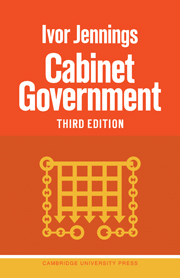Book contents
- Frontmatter
- Contents
- PREFACE
- CHAPTER I THE BRITISH CONSTITUTION
- CHAPTER II THE CHOICE OF A PRIME MINISTER
- CHAPTER III THE FORMATION OF A GOVERNMENT
- CHAPTER IV THE ADMINISTRATION
- CHAPTER V MINISTERS AT WORK
- CHAPTER VI INTER-DEPARTMENTAL RELATIONS
- CHAPTER VII TREASURY CONTROL
- CHAPTER VIII THE PRIME MINISTER
- CHAPTER IX THE CABINET
- CHAPTER X WAR AND DEFENCE
- CHAPTER XI ECONOMIC POLICY
- CHAPTER XII CONSTITUTIONAL MONARCHY
- CHAPTER XIII THE PERSONAL PREROGATIVES: DISMISSAL OF MINISTERS, DISSOLUTION OF PARLIAMENT, CREATION OF PEERS
- CHAPTER XIV PATRONAGE AND HONOURS
- CHAPTER XV GOVERNMENT AND PARLIAMENT
- APPENDIX I. GOVERNMENTS SINCE 1835
- APPENDIX II. EXAMPLES OF GOVERNMENTS
- APPENDIX III. THE PREROGATIVE OF DISSOLUTION
- APPENDIX IV. BIOGRAPHICAL AND BIBLIOGRAPHICAL NOTES
- INDEX
CHAPTER XIII - THE PERSONAL PREROGATIVES: DISMISSAL OF MINISTERS, DISSOLUTION OF PARLIAMENT, CREATION OF PEERS
Published online by Cambridge University Press: 23 September 2009
- Frontmatter
- Contents
- PREFACE
- CHAPTER I THE BRITISH CONSTITUTION
- CHAPTER II THE CHOICE OF A PRIME MINISTER
- CHAPTER III THE FORMATION OF A GOVERNMENT
- CHAPTER IV THE ADMINISTRATION
- CHAPTER V MINISTERS AT WORK
- CHAPTER VI INTER-DEPARTMENTAL RELATIONS
- CHAPTER VII TREASURY CONTROL
- CHAPTER VIII THE PRIME MINISTER
- CHAPTER IX THE CABINET
- CHAPTER X WAR AND DEFENCE
- CHAPTER XI ECONOMIC POLICY
- CHAPTER XII CONSTITUTIONAL MONARCHY
- CHAPTER XIII THE PERSONAL PREROGATIVES: DISMISSAL OF MINISTERS, DISSOLUTION OF PARLIAMENT, CREATION OF PEERS
- CHAPTER XIV PATRONAGE AND HONOURS
- CHAPTER XV GOVERNMENT AND PARLIAMENT
- APPENDIX I. GOVERNMENTS SINCE 1835
- APPENDIX II. EXAMPLES OF GOVERNMENTS
- APPENDIX III. THE PREROGATIVE OF DISSOLUTION
- APPENDIX IV. BIOGRAPHICAL AND BIBLIOGRAPHICAL NOTES
- INDEX
Summary
The Personal Prerogatives in General
The previous chapter shows that, while the Queen has in normal circumstances ‘the right to be consulted, the right to encourage, the right to warn’, she must, in the last resort, give way to the advice of the Cabinet. There are, however, certain prerogative powers which she exercises on her own responsibility, and which may fitly be called ‘the personal prerogatives’. Exactly what they are is by no means clear; for there are differences of opinion in respect of several of them. There is no controversy that she need not accept advice as to the appointment of a Prime Minister or as to the creation of peers so as to override the opposition of the House of Lords. There is controversy as to whether she can dismiss a Government or dissolve Parliament without advice, or whether she can refuse to dissolve Parliament when advised to do so.
There have indeed been suggestions that other personal prerogatives survive. William IV seems to have suggested in 1834, after the burning of the Palace of Westminster, that he could summon Parliament to meet where he pleased. Lord Melbourne replied:
There can be no question that, as your Majesty states, it is your Majesty's undoubted prerogative to appoint the meeting of your Parliament, but this place of meeting has been upon the present spot so unvariably for so many years–ever since the time of Charles II, who summoned one Parliament under very peculiar circumstances at Oxford—that, without adverting to the possibility of the House of Commons not sanctioning any arrangement made at present by voting the sums necessary to defray the expense of it, it appears.
- Type
- Chapter
- Information
- Cabinet Government , pp. 394 - 450Publisher: Cambridge University PressPrint publication year: 1959
- 1
- Cited by



